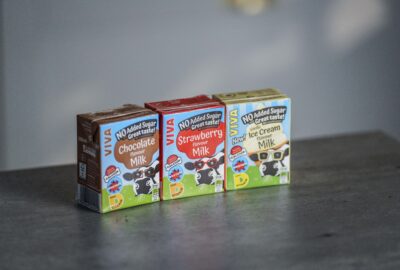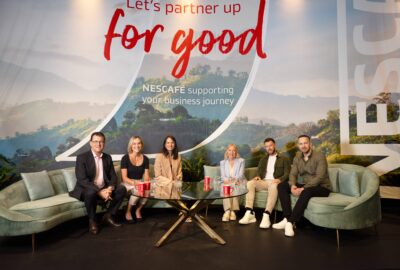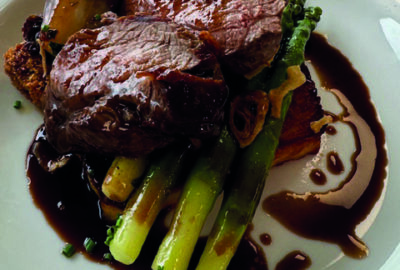Whilst food is always at the forefront of any caterer’s shopping list, a supply of quality, time-saving, non-food products is essential for the smooth-running of the kitchen. But which products should you be buying and why?
Purple power
Allergen management is vital in the professional kitchen – and caterers must take every step possible to avoid cross-contamination.
Jacqui McPeake, of Allergen Accreditation “There is obviously an element of caution when managing allergens due to the current high-profile media cases. In order to ensure that the risk of cross- contamination is minimal it is advised that a similar process is applied with allergens as with cooked/raw meats.
It is good practice to adopt a process of using purple utensils, storage and chopping boards for all dishes intended for customers with allergies. The same principle applies as when using a red chopping board for raw meat. The user will immediately be aware that they are preparing a dish which requires additional care.
“Purple serving utensils will help the catering staff to identify dishes suitable for customers with allergies and eliminate the risk of cross contamination. The presence of purple utensils also provides any customer with a food allergy a sense of confidence in your ability to cater for them.
“The European Commission has identified that seven out of 10 serious allergic reactions occur when people are outside their homes,” says Mark Hogan, commercial director of FEM. “As such, caterers are under increasing pressure to ensure that all their food offerings are prepared safely using equipment that ensures food cannot be contaminated.”
Coeliac UK runs an online training course on preventing cross-contamination www. coeliac.org.uk/food-industry-professionals/ caterers-and-restaurateurs/training-fromthe-experts/.
Green glassware
Adopting an environmentally friendly approach to running a venue, including replacing disposable, non-recyclable accessories with products that are sustainable and biodegradable, can make a difference to both the world and to the business.
For example, Parsley in Time’s PLA Glassware is produced from plantbased extracts – the eco alternative to plastic with all the same qualities. Also available, the Oxo-bio flexy glassware which will biodegrade naturally after use, via naturally occurring micro-organisms.
For light bites and snacks, Parsley in Time offers tableware produced from palm leaves that have naturally fallen from the trees and are then pressed into shape. They are free from chemicals, completely compostable and durable and robust too.
In safe hands
Disposable gloves are essential items within the catering industry – but which type should you choose?
Kevin Day, trading manager at Robinson Young, explains the differences:
NITRILE GLOVES – synthentic material designed to mimic the properties of latex but they are much stronger and more hard-wearing, 10 times more puncture-resistant than vinyl gloves. However, they’re twice the price.
LATEX GLOVES – A natural material made from rubber and therefore sustainable. They’re more stretchy and offer a closer fit but 10% of people are allergic to them.
VINYL GLOVES – A natural material with a slightly looser fit and not as hard-wearing – but significantly cheaper. Blue vinyl gloves are the most popular as they’re easy to identify if they get into food. Powdered and powder-free versions are available.
Prime packaging
With growing concern over the environmental impact of disposable packaging, particularly single-use plastics, operators are calling for greener alternatives.
Suppliers are now using materials such as bagasse – the residual fibres that remain after sugar cane is squeezed during sugar production – to meet the demands of the food-to-go market.
“Bagasse is a very fast renewable resource, as it is a by-product, it doesn’t require trees to be cut down,” says Caterpack’s David Cowie. “It is a sustainable and eco-friendly alternative to paper as it uses much less energy in production than wood paper production.
“Bagasse is very sturdy, suitable for temperatures from -25°C to 220°C, water repellent and grease-proof ideal for catering disposables. After use these products will completely biodegrade and decompose and turn into soil – soil which can be sold on and reused!”
Vegware’s new Hula paper cold cups are a great plastic-free alternative for green-minded caterers. They’re made from sustainable board and are lined with waterproof, plant-based PLA.
Kitchen chemistry
Chemicals are essential for managing cleanliness in the professional kitchen, but legislation and technologies are constantly evolving so it’s important to keep on top of the latest innovations.
Super concentrates, such as Cleenol’s Evolution Dispensing Systems, offer large savings, reduced storage space and reduced waste packaging. They allow for concentrated chemicals to be diluted at point of use, with a push/pull lever which delivers the correct amount of chemical concentrate directly into water.
An alternative to harsh chemicals is enzyme-based cleaners. Enzymes actively digest a wide range of organic matter at a microscopic level, completely removing it whilst providing superior odour control.
It’s a Wrap!
No professional kitchen can function without cling film, foil and parchment – and Wrapmaster’s dispensing kit offers key benefits. Recommended by environmental health officers, the dispenser can be sanitised and is dishwasher safe, making it easy to clean and keep cross-contamination to a minimum. Its blades are concealed and protected, so there is no risk of injury – especially during a busy service when the pressure is on, and less tangles and torn material end up in the bin. With less waste, it has been proven to make a 20% cost saving.


